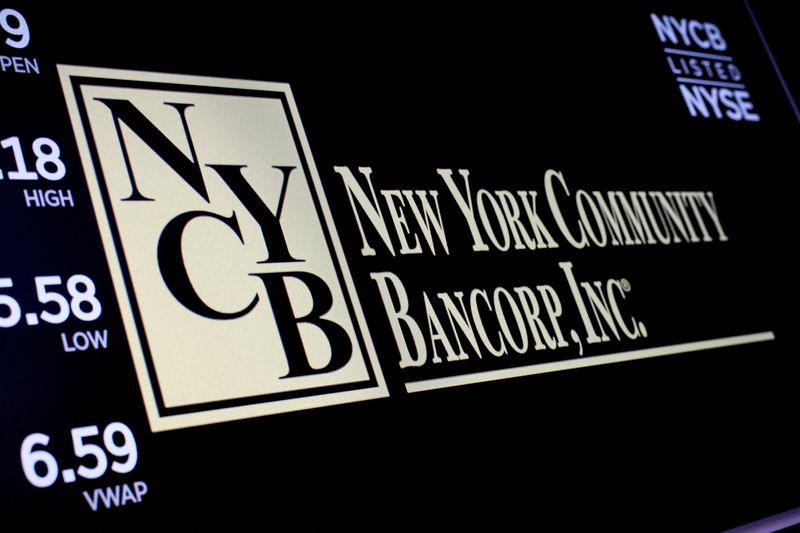By Tatiana Bautzer, Nupur Anand and Shivansh Tiwary
(Reuters) - New York Community Bancorp (NYSE:NYCB) replaced its CEO, reported a fourth-quarter loss that was more than 10 times what it previously stated and disclosed faults in its financial reporting in filings on Thursday that sent its shares tumbling.
The bank named Alessandro DiNello, executive chairman of its board, to the additional roles of president and CEO. He succeeded Thomas Cangemi, who the bank said had resigned from those roles on Feb. 23 but will remain on the company's board, according to a regulatory filing. Marshall Lux was appointed presiding director.
NYCB's stock sank almost 21% in extended trade to $3.82.
The bank said it revised its fourth-quarter loss to $2.7 billion.
On Jan. 31, the lender reported a surprise net loss that triggered a broad selloff in regional bank shares and sparked renewed concerns about the health of the industry nearly a year after three regional lenders failed.
NYCB on Thursday, in another filing, said it carried out a review in which "management identified material weaknesses in the company's internal controls." The faults "related to internal loan review, resulting from ineffective oversight, risk assessment and monitoring activities," it said.
The lender will delay the publication of its annual report because its internal controls over financial reporting were "not effective" when its books were closed in 2023, the filing showed.
"These developments are entirely surprising and disappointing," said JP Geygan, a portfolio manager and chief operating officer of Global Value Investment.
"We expect the stock to decline, and our concern now would be to understand the issues that led to this and the action the management would be taking to prevent it going ahead," said Geygan, whose company holds a stake in NYCB.
NYCB bought some of failed Signature Bank (OTC:SBNY)'s assets last year. Combined with its 2022 acquisition of Flagstar Bank, the lender's balance sheet swelled above a $100 billion regulatory threshold with stricter capital and liquidity requirements.
"The scope and magnitude of the recent leadership changes underscore the challenges facing NYCB as it works through considerable regulatory, credit and overall earnings uncertainty in its new status as an over $100 billion bank," said David Smith, a bank analyst at Autonomous Research.
Shares sank to a nearly 27-year low on Feb. 6 after the bank was sued by shareholders. In the proposed class action, investors said the regional bank defrauded them by failing to disclose it would set aside more money for credit losses, and cut its dividend 71% to shore up its balance sheet.

While the management changes were unsurprising, "the material weakness is a tough headline," wrote KBW analyst Chris McGratty. Market participants will focus on the company's delayed financial disclosures and strategic update once it finishes reviewing its loan portfolio.
"The material weakness is an added layer of uncertainty...we remain on the sidelines," he wrote.